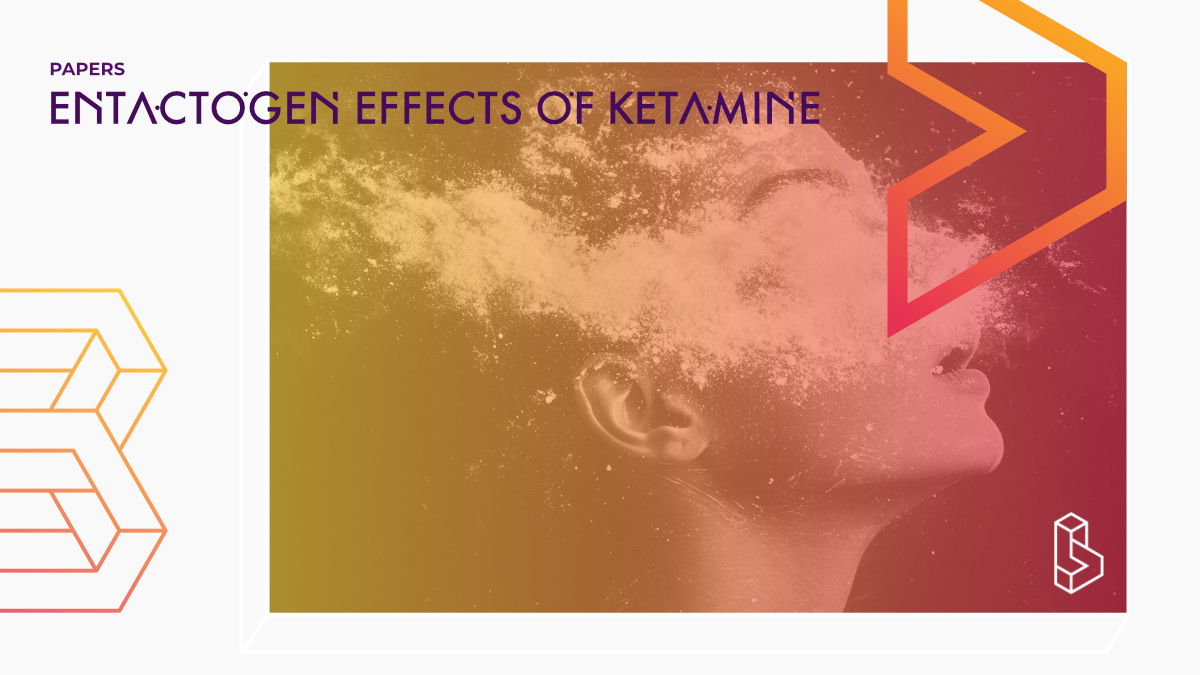This randomized, double-blind, placebo-controlled study (n=68) assesses the prosocial, entactogen effects of ketamine (35mg/70kg) in participants with treatment-resistant depression (TRD). Ketamine increased pleasure from social interactions and helping others, lasting for one week post-treatment. In a rodent experiment, ketamine-treated rats showed increased protective behaviour towards their cage mates, indicating entactogen effects.
Abstract of Entactogen Effects of Ketamine: A Reverse-Translational Study
“Objective The authors sought to assess the prosocial, entactogen effects of ketamine.
Methods Pleasure from social situations was assessed in a sample of participants with treatment-resistant depression from randomized, double-blind, placebo-controlled studies, using four items of the Snaith-Hamilton Pleasure Scale (SHAPS) at five time points over 1 week following treatment with ketamine (0.5 mg/kg intravenously) or placebo. The primary endpoint was postinfusion self-reported pleasure on the four SHAPS items pertaining to social situations, including the item on helping others, between the ketamine and placebo groups. In a rodent experiment, the impact of ketamine on helping behaviour in rats was assessed using the harm aversion task. The primary endpoint was a reduction in lever response rate relative to baseline, which indicated the willingness of rats to forgo obtaining sucrose to help protect their cage mate from electric shock.
Results Relative to placebo, ketamine increased ratings of feeling pleasure from being with family or close friends, seeing other people’s smiling faces, helping others, and receiving praise, for 1 week following treatment. In the rodent experiment, during the harm aversion task, ketamine-treated rats maintained lower response rates relative to baseline to a greater extent than what was observed in vehicle-treated rats for 6 days posttreatment and delivered fewer shocks overall.
Conclusions In patients with treatment-resistant depression, ketamine treatment was associated with increased pleasure from social situations, such as feeling pleasure from helping others. Ketamine-treated rats were more likely to protect their cage mate from harm, at the cost of obtaining sucrose. These findings suggest that ketamine has entactogen effects.”
Authors: Evan M. Hess, Dede K. Greenstein, Olivia L. Hutchinson, Carlos A. Zarate & Todd D. Gould
Summary of Entactogen Effects of Ketamine: A Reverse-Translational Study
Empathy is a crucial behavioural trait in mammals that promotes social cohesion and improves group survival. It consists of three core facets: cognitive empathy (understanding others’ emotions), emotional empathy (sharing others’ emotions), and compassionate empathy (acting on others’ emotions). Disordered empathy is associated with various psychiatric conditions, including major depression, autism spectrum disorder, substance abuse, and antisocial personality disorder.
In patients with major depression, disordered empathy often manifests as an imbalance between cognitive and emotional empathy, leading to feelings of loneliness and social disconnection. Despite the potential benefits of addressing disordered empathy, there are currently no FDA-approved pharmacotherapies specifically designed to facilitate empathy. However, psychedelic compounds such as MDMA, which belong to the entactogen or empathogen class of drugs, have shown promise in promoting emotional and social cohesion.
Given the challenges associated with developing new psychedelic therapies, researchers have begun exploring whether existing approved medications might possess entactogen properties. Ketamine, originally characterised as a dissociative anaesthetic, has recently gained attention for its rapid-acting antidepressant effects in patients with treatment-resistant depression (TRD). A single administration of ketamine can alleviate various depressive symptoms, including anhedonia and suicidal ideation, suggesting potential applications beyond mood disorders.
The authors of this study aimed to assess the prosocial, entactogen effects of ketamine in patients with TRD and to reverse translate these findings into a rodent model of empathy using the harm aversion task.
Methods
Participants
Find this paper
Entactogen Effects of Ketamine: A Reverse-Translational Study
https://doi.org/10.1176/appi.ajp.20230980
Paywall | Google Scholar | Backup | 🕊
Cite this paper (APA)
Hess, E. M., Greenstein, D. K., Hutchinson, O. L., Zarate, C. A., & Gould, T. D. (2024). Entactogen Effects of Ketamine: A Reverse-Translational Study. American Journal of Psychiatry, appi-ajp.
Study details
Compounds studied
Ketamine
Placebo
Topics studied
Depression
Treatment-Resistant Depression
Anxiety
Neuroscience
Relationships
Study characteristics
Placebo-Controlled
Double-Blind
Within-Subject
Randomized
Animal Study
Bio/Neuro
Participants
68
Humans
Rodents
Compound Details
The psychedelics given at which dose and how many times
Ketamine 35 mg | 1xLinked Clinical Trial
A Study to Evaluate Ketamine for the Treatment of Rett SyndromeThis double-blind, placebo-controlled crossover trial (n=12) investigated the effects of oral ketamine in a single 5-day BID regimen on patients with Rett Syndrome, compared to a placebo, in a 4-week cross-over design.

